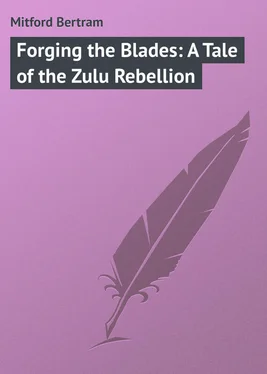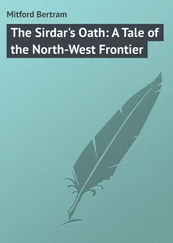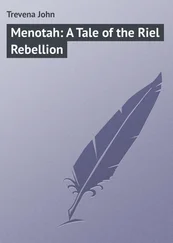“ Nkose ! A man must live,” was the answer, with a deprecatory smile. “And we are not all born chiefs.”
Sapazani’s eyes blazed into fury, and gripping his stick he half rose. But a whisper from Undhlawafa restrained him – that, combined with another thought.
“Dog of the Abelungu,” he answered, now cool and sneering. “It is well for thee that although some of us were born chiefs we are chiefs no longer. Hau ! Yet state thy message.”
The man was apologetic. Who was he to offend one of the great House of Umtetwa? he protested. He meant no such thing. He was only showing how he himself was forced to receive the white man’s money. Had there been any other way of living he need not have done so, but he was poor, and the white man ruled the land.
Then he proceeded to deliver his message. The attendance of Sapazani was required three days thence, to give evidence in a rather intricate case of disputed ownership of cattle then pending between certain of his own followers. The chief’s temper did not improve.
“Ho, Manyana. I wronged thee just now,” he said, “I called thee the white man’s dog, but we are all the white man’s dogs – I among them the most. Well, so far thy message. I will be there, as how should it be otherwise since we lie beneath the heel of these little great great ones who rule the land?” he concluded, bitterly sneering.
“ Nkose !”
“Well, there are those who will give thee food and drink. Withdraw.”
“ Nkose !”
The messenger obeyed, and the chief sat moodily. Would anything come of the unrest that was seething on the other side of the Tugela? He – to be summoned to take a long journey on account of some trumpery cattle case! Yet, was that only a pretext? was the sudden suspicion which flashed through his mind. Well, if it was not much was likely to come of it. No armed force had been mobilised by the whites as yet in any part of the country, and in case of any attempt at arresting him, why, as we have said, he was not in the habit of going into civilisation exactly alone. The voice of Undhlawafa broke in upon his musings.
“It is not well, son of Umlali, to shake sticks at those who come from the court,” he said drily. He was an old man, and privileged. “Manyana grows from a good tree, but what if some other had been sent, and had returned to say that he had been received with roughness, and that Sapazani was not loyal?”
“Loyal!” echoed the chief, in bitter disgust. “Loyal! Hau ! Loyal – to whom?”
Beyond a murmur which might have meant anything, the other made no reply. Sapazani looked up and around. It was nearly dark. The sounds of evening had merged into the sounds of night. Most of the inhabitants of the kraal had retired within the huts, for there was a chill feeling in the air. He arose.
“The other messenger,” he said. “Now we will talk with him.”
He, too, went into his hut, and drawing his green blanket round him proceeded to take snuff. Undhlawafa, who, after a whispered injunction to some one outside, had followed him, proceeded to do likewise.
Soon a man crept through the low doorway and saluted. In his then frame of mind the chief noted with double irritation that the new arrival wore that abomination, in his eyes, the article of European clothing commonly called a shirt. Squatted on the ground the latter’s mission unfolded itself bit by bit. All the tribes in the north of Natal were ready. Those in the south of the Zulu country were ready too. How was it with those in the north?
In reply to this Sapazani and his induna put a number of questions to the emissary, as the way of natives is. These were answered – some straightly, some crooked.
“And He – what is his word?”
“He is dumb,” replied the emissary. “There are those who have spoken in his ear, and He is dumb.”
Sapazani sat, thinking deeply. “He” applied to the head of the royal House. More than ever did the insidious poison of the Ethiopian preacher of whom mention has been made, come back to his mind. Now he saw his own chance. Not by force of arms alone could a change be effected; but by the dissensions among the ruling race. Now was the time – before it should pass.
“Tell him who sent you,” he said, “that at the moment I shall be ready. That is my ‘word.’”
“ Nkose !”
Chapter Eight.
The Prospectors
“I’ve got some news for you, Stride.”
He addressed was just dismounting. Obviously he had returned from a journey. His steed was flecked with sweat and had rather a limp appearance, as though ridden through the heat of a long day, and, withal, a hot one. A tent and a makeshift native shelter, together with a roughly run-up stable constituted the prospectors’ camp on the Mihlungwana River.
“Well, spit it out, then, if it’s worth having,” returned the other, with a light laugh. He was a tall, well-built young fellow, bronzed with the healthy, open-air life.
“Man, but there’s no that hurry,” said the first speaker, with a twinkle in his eyes. “First of all, what’s the news Grey Town way?”
Конец ознакомительного фрагмента.
Текст предоставлен ООО «ЛитРес».
Прочитайте эту книгу целиком, купив полную легальную версию на ЛитРес.
Безопасно оплатить книгу можно банковской картой Visa, MasterCard, Maestro, со счета мобильного телефона, с платежного терминала, в салоне МТС или Связной, через PayPal, WebMoney, Яндекс.Деньги, QIWI Кошелек, бонусными картами или другим удобным Вам способом.
A snake of the mamba species, which grows to a considerable size, very scarce, and with a proportionately bad reputation.












